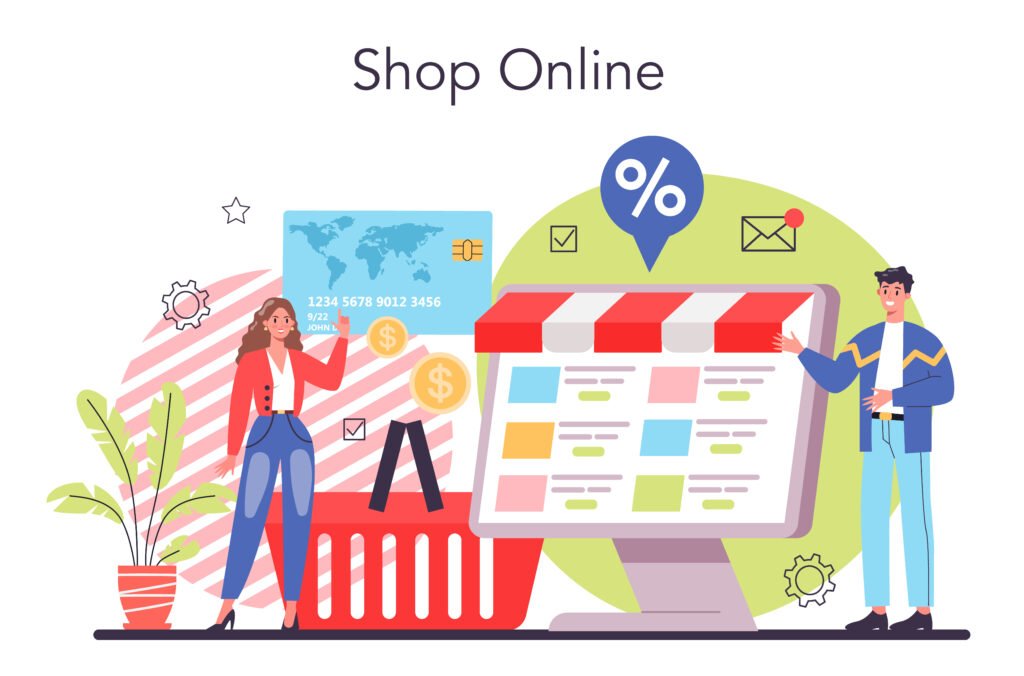The e-commerce landscape in Canada has experienced a significant transformation in the post-pandemic era. With the sudden shift in consumer behavior towards digital platforms, e-commerce companies in Canada have emerged as pivotal players in the nation's economic recovery and growth. This blog delves into the key roles these companies play, explores the top platforms, and provides insights into starting your online venture.

The Rise of E-Commerce Companies in Canada
The pandemic accelerated the adoption of e-commerce, compelling businesses to embrace online channels for survival. As a result, Canada witnessed a surge in small businesses entering the e-commerce market. Companies like Amazon, Shopify, and Walmart have played crucial roles in shaping the e-commerce landscape by offering robust platforms for merchants and consumers alike.
Key Contributions of E-Commerce Companies to the Canadian Economy
Job Creation:
E-commerce has generated numerous employment opportunities across various sectors, including technology, logistics, and marketing.
Boosting Small Businesses:
Platforms like Shopify and Amazon empower small businesses to reach a wider audience.
Economic Resilience:
As a result of the shift to digital commerce, businesses have become more resilient to future disruptions.
Innovation and Startups:
The post-pandemic era has seen a surge in startups focusing on e-commerce technologies and services.
Top E-Commerce Platforms in Canada
If you’re considering venturing into the e-commerce space, here are some of the top platforms in Canada:
- Shopify: A leading platform for businesses of all sizes.
- Amazon: Dominates the B2C market with its vast product offerings.
- Walmart: A growing player in online shopping sites.
- Framebake Technology: Providing innovative solutions for small businesses in the digital landscape.
List of Top E-Commerce Companies in Canada
Here is a curated list of some of the most influential e-commerce companies in Canada:
- Shopify
- Amazon Canada
- Walmart Canada
- Best Buy Canada
- eBay Canada
- Framebake Technology
- Hudson’s Bay
- Canadian Tire
- Home Depot Canada
- Wayfair Canada
These companies have made a significant impact by creating seamless shopping experiences and driving innovation.
How to Launch an E-Commerce Business in Canada
The rise of digital shopping has made launching an e-commerce business in Canada a promising opportunity for aspiring entrepreneurs. With platforms like Shopify leading the way, setting up an online store has never been easier. However, navigating the process requires careful planning and knowledge of legal and operational steps. Below, we provide a step-by-step guide to help you establish a successful e-commerce business in Canada.
1. Do market research and select a niche.
Before launching your business, it's essential to research the Canadian e-commerce market. Identify profitable niches and learn about your target audience. Analyze existing competition and note how top companies succeed in the market. You can even get inspiration from the Top 10 or Top 20 e-commerce companies in the world.
2. Create a Business Plan
A comprehensive business plan is critical for mapping out your goals, financial projections, and marketing strategies. Include details about your products, target customers, and operational structure. Having a well-structured business plan will guide your decisions and help you secure funding if necessary.
3. Register Your E-Commerce Business and Obtain a License
When registering a business in Canada, it's essential to obtain the appropriate license. Depending on the province and the nature of the business, different types of licenses or permits may be required. Moreover, compliance with tax regulations is crucial to avoid potential legal complications.
4. Choose the Right E-Commerce Platform
Selecting the right platform is vital for your success. Many Canadian entrepreneurs prefer Shopify for its user-friendly features, scalability, and secure payment options. Whether you're building a small or large e-commerce website, Shopify provides flexible solutions to cater to all business sizes.
5. Build an Engaging E-Commerce Website
Since your website represents the face of your online business, it's important to create an intuitive and visually appealing interface. Additionally, making online shopping convenient for customers should be a priority. Furthermore, ensure the site is mobile-friendly and optimized for search engines to attract organic traffic effectively.
6. Set Up Payment and Shipping Solutions
Integrate reliable payment methods that customers in Canada commonly use. Provide a variety of payment options, including credit cards, PayPal, and digital wallets. Additionally, partner with reputable shipping companies to provide fast and efficient delivery services.
7. Develop a Strong Marketing Strategy
Given that marketing plays a crucial role in the success of your e-commerce business, it is essential to invest in search engine optimization (SEO), social media marketing and paid advertising campaigns to increase visibility. In addition, Framebake Technology provides digital marketing solutions specifically tailored to e-commerce businesses, further helping you stand out in a competitive market.
8. Test and Launch Your E-Commerce Store
Before going live, thoroughly test your website for functionality, loading speed, and security. Address any technical issues to ensure a seamless user experience. Once ready, launch your store with a promotional campaign to generate buzz.
9. Monitor Performance and Optimize
After launching your store, continuously monitor its performance using analytics tools. Identify areas for improvement and optimize your website and marketing strategies accordingly. The e-commerce landscape evolves rapidly, so staying adaptable is key.
Best E-Commerce Ideas for Small Businesses
The e-commerce landscape offers endless opportunities for small businesses to thrive in the digital marketplace. With the right idea and strategy, small business owners can tap into online customers and establish a strong brand presence. Below are some of the best e-commerce ideas for small businesses to inspire your entrepreneurial journey.
1. Targeted Box Services for Specialized Products in E-Commerce Companies in Canada
Subscription box services have become extremely popular in recent years. Creating a niche service that caters to specific interests — like organic snacks, artisanal coffee, or beauty products — can set your small business apart. Many websites have successfully adopted this model, making it a part of the top 100 e-commerce ideas for aspiring entrepreneurs.
2. Handmade and Artisanal Products
If you have a passion for crafting, consider selling handmade goods like jewelry, candles, or pottery. E-commerce platforms such as Etsy make it easier for small businesses to reach global customers looking for unique, one-of-a-kind products.
3. Sustainable and Eco-Friendly Products
Since consumers are becoming more environmentally conscious, the demand for sustainable and eco-friendly products continues to grow. Consequently, offering green alternatives such as reusable water bottles and biodegradable packaging materials can help your small business gain traction in the market.
4. Personalized and Custom Products
Personalization is a major trend in the e-commerce space. Small businesses can offer customized products such as monogrammed clothing, personalized jewelry, and engraved gadgets. Personalized goods often attract loyal customers who appreciate thoughtful and tailored options.
5. Digital Products and Online Courses
Selling digital products like e-books, templates, or software is a great way for small businesses to generate passive income. Additionally, if you have expertise in a particular field, creating online courses can be a profitable venture. Many websites specializing in education services have become part of the top 100 e-commerce platforms globally.
6. Health and Wellness Products
The health and wellness industry continues to thrive. Selling products like vitamins, organic skincare items, and fitness accessories can be a lucrative e-commerce idea. Small businesses can also tap into specialized health segments like vegan supplements or natural remedies.
7. Pet Supplies and Accessories
Pet owners love to pamper their furry friends, making pet supplies and accessories a profitable e-commerce niche. From gourmet pet treats to stylish collars and toys, there are endless possibilities to explore.
8. Home Décor and DIY Kits
With the rise of home improvement trends, many customers are looking for creative ways to enhance their living spaces. Offering stylish home décor items or DIY kits for personalized projects can attract craft and design enthusiasts.
9. Apparel for Specific Niches
Instead of trying to compete with big fashion retailers, small businesses can succeed by targeting specific niches such as maternity wear, plus-size fashion, or sustainable clothing. Niche apparel websites often have a loyal customer base and high engagement.
10. Online Grocery Store for Specialty Foods
With online grocery shopping becoming more common, small businesses can capitalize on the trend by offering specialty food items. Focus on organic, gluten-free, or international cuisines to attract health-conscious and adventurous food lovers.
Tax and Licensing for E-commerce Companies in Canada
Understanding tax obligations and obtaining the right license is crucial for running a legal and successful e-commerce business in Canada. Compliance ensures long-term sustainability and growth.

Why Framebake Technology is a Game-Changer for E-Commerce in Canada
Framebake Technology stands out as a leader in providing cutting-edge solutions for small businesses and startups. Their platform offers scalable, secure, and user-friendly tools for entrepreneurs looking to establish or grow their online presence.
The Future of E-Commerce in Canada
As the digital landscape continues to evolve, e-commerce companies in Canada are poised for further growth. Emerging trends include:
- Free and subscription-based delivery services
- Advanced AI-driven shopping experiences
- Enhanced mobile platforms
- Sustainability-focused business models
In conclusion, the role of e-commerce companies in Canada cannot be overstated. From empowering small businesses to driving technological innovation, they are at the forefront of the country’s post-pandemic economic growth. Whether you are a consumer, entrepreneur, or investor, the opportunities in this sector are vast and promising.
Start your journey today with the right platform, strategic planning, and partners like Framebake Technology to ensure success in the dynamic world of e-commerce.


